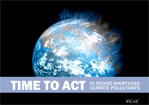The Climate and Clean Air Coalition to Reduce Short-Lived Climate Pollutants (CCAC) has released a graphic publication highlighting that a rapid uptake of recently-identified near-term ‘win-win' measures targeting emissions from short-lived climate pollutants (SLCP) bears potential to quickly improve human well-being, with multiple benefits.
 24 June 2014: The Climate and Clean Air Coalition to Reduce Short-Lived Climate Pollutants (CCAC) has released a graphic publication highlighting that a rapid uptake of recently-identified near-term ‘win-win’ measures targeting emissions from short-lived climate pollutants (SLCP) bears potential to quickly improve human well-being, with multiple benefits.
24 June 2014: The Climate and Clean Air Coalition to Reduce Short-Lived Climate Pollutants (CCAC) has released a graphic publication highlighting that a rapid uptake of recently-identified near-term ‘win-win’ measures targeting emissions from short-lived climate pollutants (SLCP) bears potential to quickly improve human well-being, with multiple benefits.
Such measures range from implementing energy-to-waste solutions, eliminating high-emitting vehicles, to avoiding hydrofluorocarbon (HFC) use by phasing in new technologies in industry.
The publication, titled ‘Time to Act to Reduce Short-Lived Climate Pollutants,’ presents latest scientific findings on SLCPs in non-technical language and with infographics. It highlights the relevance of SLCPs to near term climate change, and stresses that identified ‘win-win’ measures, which are cost-effective and readily available, could deliver multiple benefits for climate protection, public health, and food and energy security. In addition to a recommendation to phase down the production and consumption of HFCs, the publication presents 16 black carbon and methane control measures targeting primary SLCP-emitting sectors, including fossil fuel production and distribution, energy use in the residential, transport and industry sectors, waste management and agriculture.
CCAC highlights that likely benefits of large-scale implementation of measures to target SLCP emissions by 2030 include: prevention of 2.4 million premature deaths per year resulting from outdoor pollution; avoidance of crop yield losses representing an increase of up to 4% in total global annual production; and slowing down of global warming expected by 2050 by around 0.5°C.
The publication was launched at the UN Environment Assembly (UNEA) in Nairobi, Kenya, and builds on, inter alia, the UNEP Synthesis Report from 2011 titled ‘Near-Term Climate Protection and Clean Air Benefits: Actions for Controlling Short-Lived Climate Pollutants.’ The graphic publication is intended as an information and communication resource for governments, non-governmental organizations (NGOs) and other public and private organizations.
CCAC is a voluntary partnership of governments, intergovernmental organizations, private sector and environmental community representatives, and other civil society members. It focuses on addressing SLCPs, including methane, black carbon and HFCs, through awareness-raising, support to new national and regional actions, promotion of best practices, and improving scientific understanding of SLCPs. The CCAC secretariat is hosted at UNEP. [UNEP Press Release] [Publication: Time to Act to Reduce Short-Lived Climate Pollutants] [IISD-RS Coverage of the CCAC Side Event on SLCPs] [IISD RS Coverage of the UN Environment Assembly] [CCAC Website] [Publication: Near-term Climate Protection and Clean Air Benefits]